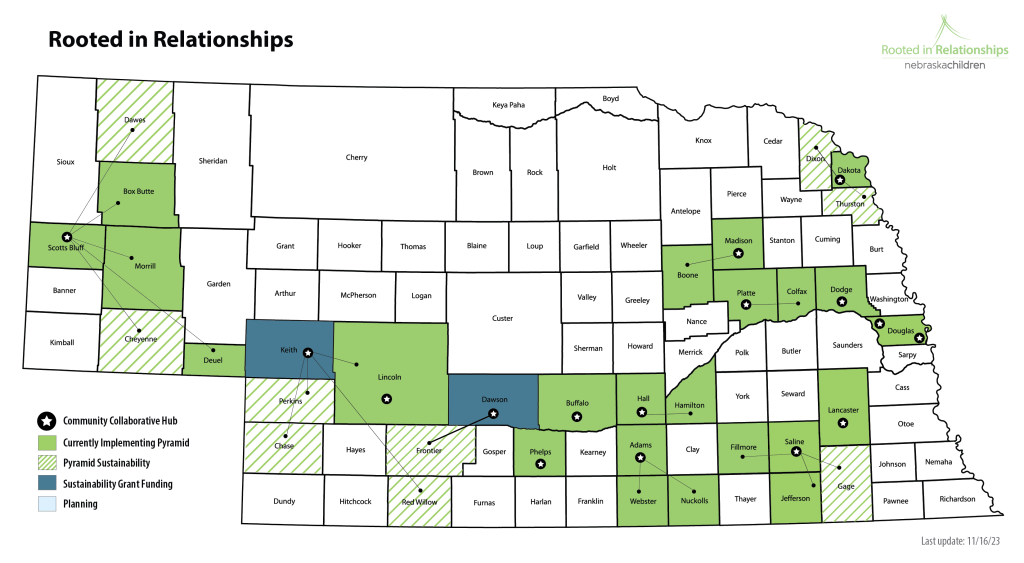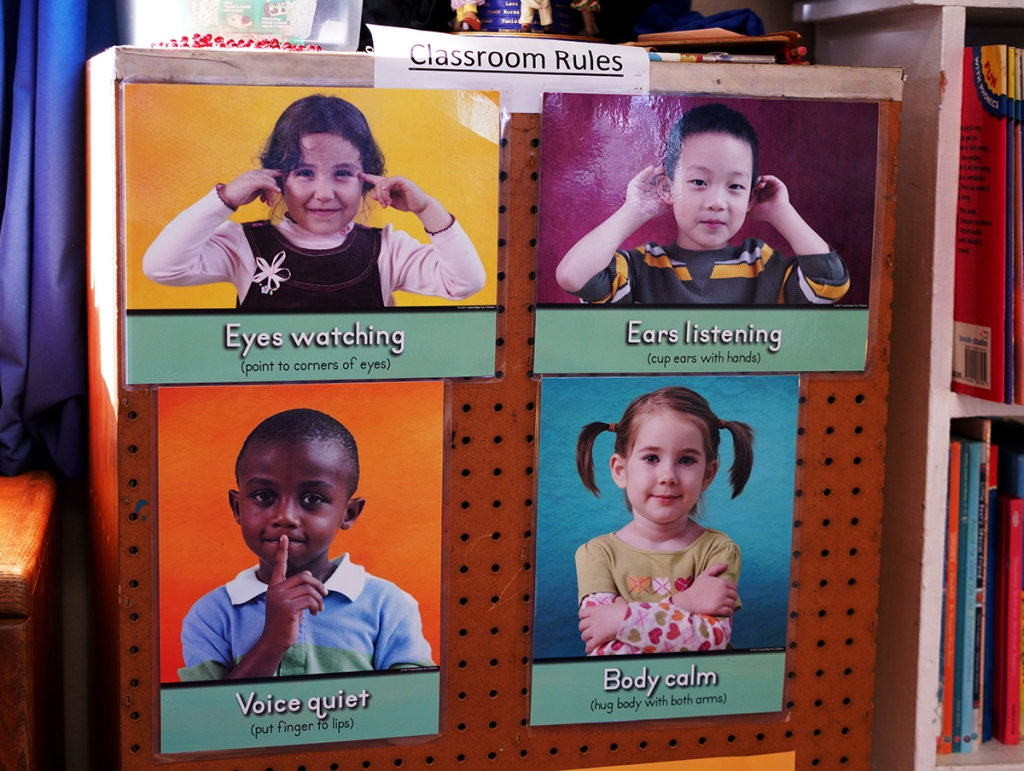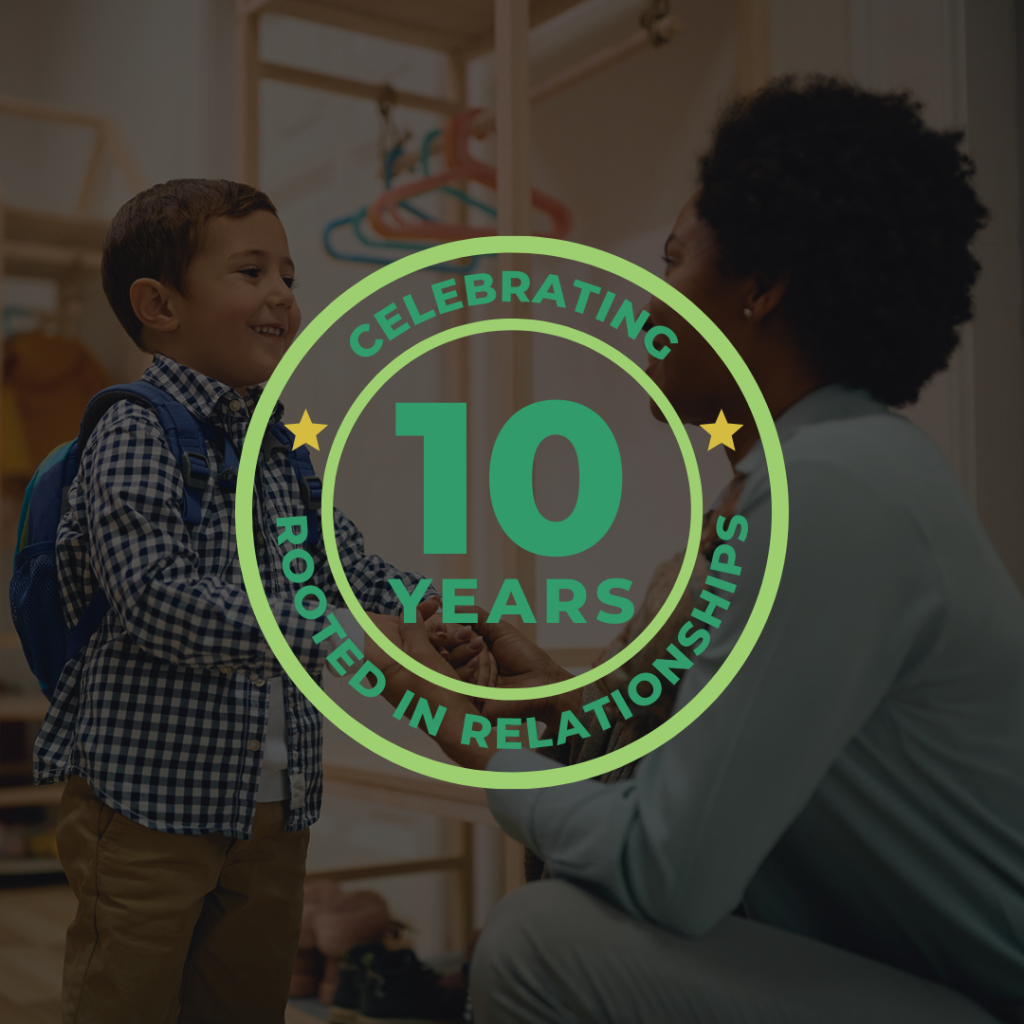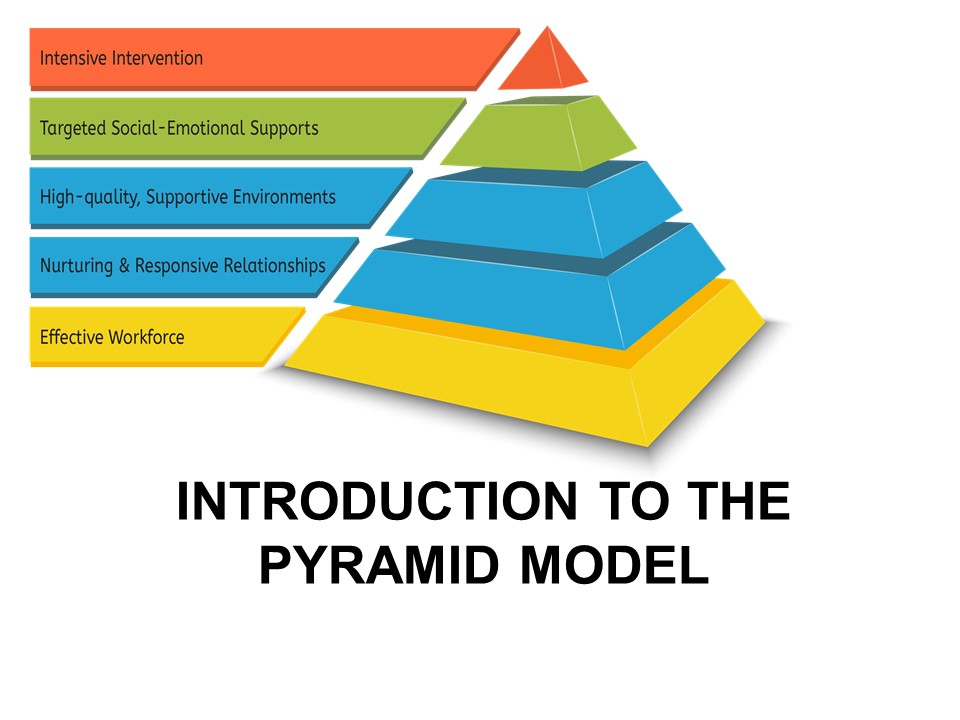Misty Freeman, a home-based childcare provider in Dawson County, said the reason she became interested in Rooted in Relationships was “because I had just taken over a daycare and I was nervous, so I was really overwhelmed.” Misty is not alone in her concerns as research has shown that providers report dealing with tantrums and other aggressive behavior takes significant time away from playing and learning. Ten years ago, Rooted in Relationships began offering providers like Misty training and coaching to help them feel confident as professionals and to teach children how to understand and self-regulate emotions. But in the partnerships Rooted builds with communities, the initiative offers so much more.
Rooted in Relationships, which celebrates 10 years of success, was designed to partner with communities to build early childhood mental health infrastructure that supports community-based child care providers and helps children develop the social emotional skills that promote later success in school and in life.
Rooted began as an idea when the Buffett Early Childhood Fund (BECF) approached Nebraska Children and Families Foundation asking for a proposal to address Sixpence data they’d consistently encountered about the social emotional needs of young children. Betty Medinger was hired as a consultant and soon established a team, including the Nebraska Department of Education, the Department of Health and Human Services, and private therapists, to develop an implementation concept. Since 2007, certain specialists in Nebraska had been trying to establish the use of the Pyramid Model (to learn more about the Pyramid Model see https://blog.nebraskachildren.org/2019/12/11/pyramid-model-tips-for-parents/) as an approach to working with young children.The Model’s train-coach-train design had already seen positive results from those in the state who had implemented it. This became the core system of what Rooted was to become.
In 2013, Rooted in Relationships was formalized when Lynne Brehm was hired to implement the concept. Brehm had already been working on mental health in the early childhood system and saw the promise of the Pyramid Model as a foundation for the work Rooted would do. She coordinated with the team to establish an early vision, which included a focus on centering the work in rural communities, on using the Pyramid Model as a tool for home- and center-based early childhood professionals, and on working with communities to build early childhood mental health infrastructure.
Three communities were piloted in the first year, Dakota County, Dawson County, and Saline County, and the success of the program quickly became evident. Janie Snieder, a Pyramid Model lead coach and mental health provider in Dakota County, described an angry and aggressive young boy she encountered in one center who didn’t know how to make friends with other children. She said that by the end of the training/coaching, the boy knew how to identify his feelings and how to go to the teacher when he needed support. Elaine Steinman, the educator working directly with the boy, said, “I kept telling him I had his back and he started putting more trust in me.” She said that she knew the pyramid training was working when another young boy “came in who was having a hard time.” Steinman said the child she’d been working with came up to the new boy, put his arm around him, and said, “I got your back.” Steinman knew then she had made a positive difference in the child’s life. Snieder reported that the boy who had been angry and unable to make friends was “much happier and doing really well in kindergarten.”
The success of the program has led to growth. In the end of the first year, Brehm, who had been working alone, said she hired a part-time professional to work alongside her. In the second year, additional funding from the state’s early childhood mental health allocation Nurturing Healthy Behaviors allowed Rooted to hire a second part-time staff member and add three more counties. The initiative, which employs a hub-and-spoke approach, now has 16 county hubs that provide outreach to 33 communities in Nebraska and seven Rooted in Relationships staff.

Furthermore, the Pyramid Model has taken root. Cindy Hoyer, a home-based provider, said, “Since I started the Pyramid Model, I’ve noticed a huge change in how my daycare runs. It just goes so much smoother. The kids get along. I feel better.” Another provider said she recognized potentially problematic behaviors before they got started and “before they’ve become a problem or an issue we’ve been able to stop those (the behaviors).” Perhaps most telling of the shifts Pyramid Model training and coaching has created is a story told by Angie Lange, a center director in Dodge County, who tells of a father who came in one morning and asked, “what are you teaching these kids?” because his young daughter had come home and said, “Dad, I’m so frustrated!” As Lange puts it, “for that 3-year-old to say that and use it in the correct context. The dad was just floored!”
But Rooted’s first ten years has seen so much more than just Pyramid Model success. Sami Bradley, who was hired 8 years ago as the Associate Vice President for Infant Mental Health for Rooted, says that the initiative ”consistently keeps early childhood mental health at the forefront during our conversations and decision-making processes,” and points to some of the work Rooted has done to impact families, providers, and other early childhood professionals in promoting the well-being of young children. Circle of Security Parenting and Circle of Security Classroom have taught families and educators to build strong positive bonds with children so they feel secure and confident. Diane Bruha, a stakeholder team member for Saline County, underscores the importance Circle of Security holds for her community, “in order to have happy babies, happy children that are able to come to school and learn, they have to have the support of parents who are able to work with them and enrich them and support their emotional needs at home.” To further support strong parent-child bonds, Rooted has also worked with Parents Interacting with Infants (PIWI). These evidence-based practices can be used in parent-child group settings, during home visits, or in other settings to support positive relationships for parents with children ages 0-2.

Perhaps some of the most important work Rooted has done in its first 10 years is, according to Bradley, “building the professionalism of early childhood providers.” She says that she sees their confidence raised as they begin to see themselves as the professionals they are. Brehm echoes this, saying that “providers feel more comfortable and competent about the work they’re doing with young children as they utilize the variety of tools learned through training and coaching.” One recent Rooted collaboration that has emphasized professional development is the Nebraska Association of Infant Mental Health’s endorsements that allow professionals, from providers to psychologists, to achieve different levels of internationally-recognized endorsements from the Alliance for the Advancement of Infant Mental Health. In its first year and a half, the Nebraska Association of Infant Mental Health endorsed roughly 43 professionals across the state, awarding them a professional endorsement that further bolsters their confidence in working with young children and recognizes the important work they do. Teresa Dressman, for example, a provider who received an endorsement said, “it’s nice to be acknowledged. I don’t have a college education. This validates what I do.”
The endorsements point to one more major accomplishment of Rooted over the ten years of its existence in Nebraska, infrastructure building. Both within communities and across the state, Rooted has worked to connect and develop the necessary systems to support those who work within the early childhood mental health system. A perfect example is the work the initiative has recently done in using Preschool Development Grant funds to explore building within urban communities. In Omaha, Rooted has created a strong bilingual presence in the largely Spanish-speaking area of South Omaha. Coaches are bilingual and all materials are provided in Spanish. Similarly, the initiative has made connections in North Omaha where 100% retention of providers was achieved in the first year of implementation. Brehm points out that community wins like this that allow small-scale infrastructure building come from working within communities to find the people they trust within their own areas. She says, “I feel like we listen to what communities say. There are some things we do have to implement in a prescribed way, like the Pyramid Model. But communities have a lot of flexibility in who they choose and how they do that.” While communities build internally, the state system continues to grow and unify. Bradley points out that “the number of Pyramid Model coaches and trainers across the state has grown exponentially in the last 10 years.
It is that continued building of infrastructure that Brehm says she wants to see in the future. Her goal for Rooted in Relationships would be to see local and statewide systems that can be sustained even if Rooted no longer exists. She emphasizes the importance of that sustainability when she says, “if you focus more on kids prevention-wise, you’ll see less need for intervention and high-level services down the road in communities,” a sentiment that speaks not only to Rooted’s work but also to the larger scope of Nebraska Children’s vision. Rooted in Relationships has built ten years’ worth of community and state infrastructure and continues to find new avenues for training, coaching, and professional development in early childhood mental health. Brehm says she’s been asked on numerous occasions when Rooted will be done. Her response, “it will never be done. You’re always going to need to have a system in place to train and support people.” The possibility of ten more years of Rooted’s focus on the well being and mental health of Nebraska’s children seems then less like a hope and more like a necessity.





Leave a comment